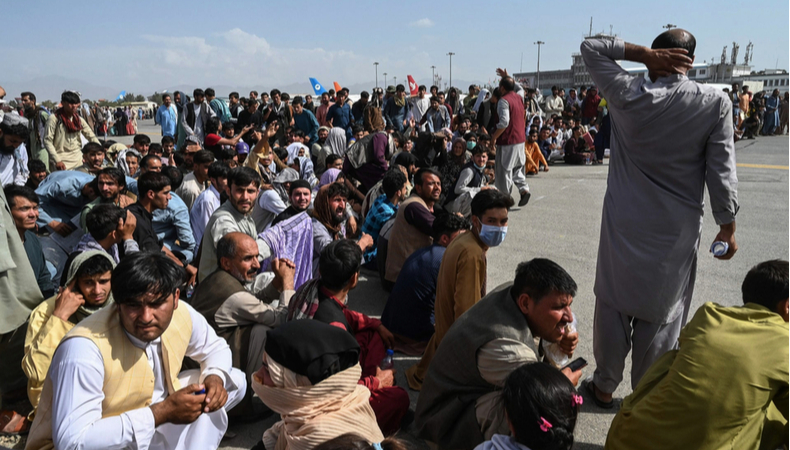Could waves of migrants from Afghanistan bring Greece and Turkey closer?

Greece first lulled and then abandoned the idea of pushing Afghan refugees back to the Turkish border. A choice determined by the outcome of the videoconference with which the foreign ministers of Europe took stock of the humanitarian crisis that arose following the return of the Taliban to power in Afghanistan, agreeing on the essential role of Ankara in containing migratory flows from the east.
A migratory flow has never stopped in recent years, but now the EU expects to become the scene of a humanitarian crisis. Ankara and Athens have come back from two years of harsh accusations. Turkey has documented and repeatedly denounced the illegal refoulement of thousands of migrants, most of them Afghans, by Athens, both by land and by sea.
The Greek foreign minister said that Greece would not be “the gateway to the EU” for the Afghans; Turkish President Recep Tayyip Erdogan has clarified that Turkey will not be “Europe’s refugee depot.” Affirmations that place Ankara and Athens on the same line decided not to use the EU from a purely-containing perspective. The Turkish government has repeatedly reiterated that it is the country in the world with the highest number of refugees. While Erdogan has paid a very high price in terms of consensus for the reception guaranteed to Syrians in recent years, he cannot afford to challenge a biased public opinion and is intensifying relations with Pakistan to stabilize the region and stop the refugee flows.
Erdogan has no room for error given the crucial elections of 2023. He will not afford a new refugee management agreement, as happened with the Syrians in 2016. If the situation precipitates, it is foreseeable that it will open the border with Greece and Bulgaria; in fact, the Afghans consider Turkey a transit to Europe.
The UN Refugee Agency, UNHCR, registers that Turkey currently hosts at least 117,000 Afghans. In comparison, there are about 40,000 Afghans on Greek soil, 20,000 refugees, and 20,000 asylum seekers, compared to just 11,600 refugees. In addition, Afghans were welcomed by European countries in the last year. Athens has been trying for months to persuade Ankara to take back 2,000 Afghans whose asylum applications have been rejected but could cease in light of Turkey’s role in containing Afghans.
“We are facing a migratory flow that has intensified in the last three months, in transit from Iran, Iraq, and Turkey. It is with these countries that we must work to prevent a humanitarian crisis. In this, Turkey will have a fundamental role”, declared the High Representative for European Foreign Policy, Joseph Borrell.
However, Borrell did not talk about Europe’s strategies, which, indeed, by setting increasingly stringent and challenging criteria for the issuance of visas, has prompted many Afghans to choose the path of illegal migration. The old continent is the destination by truck and on foot trip that passes through Iran, from the high mountains to the border with Turkey. It is made even more difficult by the wall wanted by the Turkish government along with the entire frame with Syria, Iraq, and Iran. It then provides for the crossing of the whole country from east to west.’
On the Turkish western borders, some pay smugglers up to $ 5,000 who promise to take them to Greece on makeshift boats or arrange them as best they can on rafts or small boats with which to brave the few nautical miles that separate them from the Greek islands, with life jackets. Others prefer the march to the banks of the Evros River, which marks the border between Turkey and the EU. From there, they hope to obtain the status of refugees, technically possible in the first EU country, or to attempt the Balkan route if the reception is denied.
When the agreement between Ankara and the EU was still in force in 2019, 440,000 irregular migrants were detained in Turkey, while in 2018, they were 268,000. But the most significant is that 45.5% of the total were Afghans. Numbers certify that migration from Afghanistan has been a problem that Europe has never faced in recent years, and that is now back in the limelight with the capture of Kabul by the Taliban. Erdogan has lost consensus in recent years precisely due to the policy of open doors to Syrians. In recent weeks public opinion and members al have been in turmoil about the arrival of refugees, and a new reception strategy would be suicide because of the elections of 2023.
Athens must press on the EU for a common strategy that involves and convinces Turkey, even if at the moment the only common path for Erdogan and Europe seems to be the one that leads to stopping the flow of refugees at the source. If it were not successful, an operation would leave the Turkish president no choice but to open the borders with the EU. Meanwhile, Greece has raised a fence equipped with a surveillance system along a 40-kilometer border with Turkey to stop a possible migrant’s wave from Afghanistan. Yesterday the Greek Minister of Citizens’ Protection, Michalis Chrisochoidis, during a visit to the Evros region, said that his country could not passively wait for the possible impact. He stressed that Greece’s borders would remain inviolable.
Chrisochoidis statements follow the comments of Turkish President Recep Tayyip Erdogan, according to whom a sharp increase in the population leaving Afghanistan could represent “a serious challenge for all.” According to Erdogan, “a new wave of migration is inevitable if the necessary measures are not taken in Afghanistan and Iran.” For his part, Chrisochoidis noted that the Afghan crisis had created new possibilities for migrant flows in Europe.




